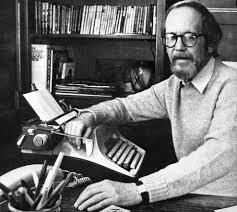
A few droppings from Elmore Leonard's LaBrava, which I finished over the weekend.
He's a master of the dialog technique that, in plays, is called stichomythia. For example:
LaBrava said, "All the money you got, why don't you buy a new car?
Maurice said, "You know what you're talking about? This car's a classic, collector's model."
"Then you oughta get a tune."
Maurice said, "What do you mean, all the money I got?"
"You told me you were a millionaire one time."
"Used to be," Maurice said. "I spent most of my dough on booze, broads and boats and the rest I wasted."
This is the kind of thing he's famous for and that comes through in the film versions (Get Shorty, Jackie Brown, which is based on Rum Punch) of his novels. His descriptive powers deserve more attention. A desolate urban landscape:
They got out and Cundo led the way through an open gate in the fence, in close darkness through rubble--just like buildings he had seen in Cuba in the revolution--through overgrown bushes and weeds choking the walk that had once led through a garden along the side of the hotel. There were rusted beer cans and maybe rats. As they reached the open ground behind the hotel, Cundo watched the headlights on the MacArthur Causeway off to the left, not far, the cars coming out of darkness from the distant Miami skyline. The old man was missing it. His head was bent back to look up at all those dark windows--hotel this big and not one light showing. He should go inside and see the destruction, like it was in a war.
A room inside the Miami Beach Police Department's Detective Bureau:
The squad room inside was like all the squad rooms he had ever seen in older police buildings: different types of desks and tables bunched in rows to conserve space, a few men at desks who might have been athletes at one time, solidly built, or had the look of career noncoms in civilian clothes. No one wore a shoulder holster anymore; they packed Smiths on their hipbones, short-barreled mags with big grips. In a corner of the room was a holding cell--and this was different from all the others he had ever seen--made of wrought-iron bars, the kind of ornamental grillwork you might find on a Spanish patio.
The details, tossed off so unassumingly--the headlights on the freeway and the contrast with the abandoned hotel, the ornamental grillwork on the holding cell, like something on a Spanish patio, only it's a jail cell in the cop station--are better even than the dialog.
